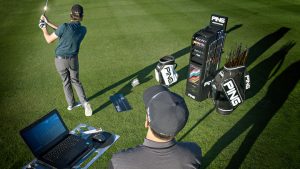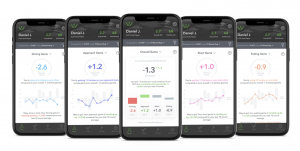The future of club fitting is going virtual (GolfWRX.com)
Thanks to technology, you can buy everything from custom-made suits to orthotics online without ever walking into a store or working in person with an expert. Now, thanks to the help of video and launch monitors, along with a deeper understanding of dynamics than ever before, club fitting is quickly going virtual too, and it’s helping golfers find better equipment faster!

The real advancements started in the coaching world around a decade ago. What used to require heavy cameras and tripods now simply requires a phone and you have high-definition slow-motion video that can be sent around the world in a matter of seconds.

Beyond video, modern launch monitors and their ability to capture data have quickly turned a guessing game of “maybe this will work” into a precision step-by-step process of elimination to optimize. When you combine video and launch monitor elements with an understanding of club fitting principles and basic biomechanics you have the ability to quickly evaluate a golfer’s equipment and make recommendations to help them play better golf.
The benefits of virtual fitting
The key element of a virtual fitting is the deep understanding of the available products to the consumer. On an OEM level, line segmentation makes this fairly straightforward, but it becomes slightly more difficult for brand-agnostic fitters that have so many brands to work with, but it also shows their depth of knowledge and experience.
It’s from this depth of knowledge and through an interview, a fitter can help analyze strengths and weaknesses in a player’s game and use their current clubs as a starting point for building a new set – then the video and launch monitor data comes in.
But it can quickly go very high level…
One of the fastest emerging advancements in this whole process is personalized round tracking data from companies like Arccos which gives golfers the ability to look at their data without personal bias. This allows the golfer along with any member of their “team” to get an honest assessment of where improvements can be found. The reason this is so helpful is that golfers of all skill levels often have a difficult time being critical about their own games or don’t even really understand where they are losing shots.

It’s like having a club-fitter or coach follow you around for 10 rounds of golf or more—what was once only something available to the super-elite is now sitting in your pocket. All of this comes together and boom, you have recommendations for your new clubs.
Current limitations
We can’t talk about all the benefits without pointing out some of the potential limitations of virtual club fittings, the biggest being the human element that is almost impossible to replicate by phone or through video chat.
The other key factor is how a player interprets feel, and when speaking with an experienced fitter recently while conducting a “trial fitting” the biggest discussion point was how to communicate with golfers about what they feel in their current clubs. Video and data can help draw some quick conclusions but what a player perceives is still important and this is where the conversation and interview process is vital.
There are a lot of companies offering virtual fittings or fitting consultations over the phone. One of the biggest programs is from Ping and their Tele-Fitting process, but other companies like TaylorMade and PXG also have this service available to golfers looking for new equipment.
Smaller direct-to-consumer brands like New level, Sub 70, and Haywood Golf have offered these services since their inception as a way to work with consumers who had limited experience with their products but wanted to opportunity to get the most out of their gear and their growth has proven this model to work.
Pokračovat ve čtení...
Thanks to technology, you can buy everything from custom-made suits to orthotics online without ever walking into a store or working in person with an expert. Now, thanks to the help of video and launch monitors, along with a deeper understanding of dynamics than ever before, club fitting is quickly going virtual too, and it’s helping golfers find better equipment faster!
What really took so long?

The real advancements started in the coaching world around a decade ago. What used to require heavy cameras and tripods now simply requires a phone and you have high-definition slow-motion video that can be sent around the world in a matter of seconds.

Beyond video, modern launch monitors and their ability to capture data have quickly turned a guessing game of “maybe this will work” into a precision step-by-step process of elimination to optimize. When you combine video and launch monitor elements with an understanding of club fitting principles and basic biomechanics you have the ability to quickly evaluate a golfer’s equipment and make recommendations to help them play better golf.
The benefits of virtual fitting
- Any golfer with a phone and access to a launch monitor can get high-level recommendations from a qualified fitter.
- Time and cost-saving to and from a fitter. (This seems obvious but one of the reasons I personally receive so many questions about club fitting is because those reaching out don’t have access to fitting facilities within a reasonable drive)
- It’s an opportunity to get a better understanding our your equipment from an expert.
How virtual fittings really work
The key element of a virtual fitting is the deep understanding of the available products to the consumer. On an OEM level, line segmentation makes this fairly straightforward, but it becomes slightly more difficult for brand-agnostic fitters that have so many brands to work with, but it also shows their depth of knowledge and experience.
It’s from this depth of knowledge and through an interview, a fitter can help analyze strengths and weaknesses in a player’s game and use their current clubs as a starting point for building a new set – then the video and launch monitor data comes in.
But it can quickly go very high level…
One of the fastest emerging advancements in this whole process is personalized round tracking data from companies like Arccos which gives golfers the ability to look at their data without personal bias. This allows the golfer along with any member of their “team” to get an honest assessment of where improvements can be found. The reason this is so helpful is that golfers of all skill levels often have a difficult time being critical about their own games or don’t even really understand where they are losing shots.

It’s like having a club-fitter or coach follow you around for 10 rounds of golf or more—what was once only something available to the super-elite is now sitting in your pocket. All of this comes together and boom, you have recommendations for your new clubs.
Current limitations
We can’t talk about all the benefits without pointing out some of the potential limitations of virtual club fittings, the biggest being the human element that is almost impossible to replicate by phone or through video chat.
The other key factor is how a player interprets feel, and when speaking with an experienced fitter recently while conducting a “trial fitting” the biggest discussion point was how to communicate with golfers about what they feel in their current clubs. Video and data can help draw some quick conclusions but what a player perceives is still important and this is where the conversation and interview process is vital.
Who is offering virtual club fittings?
There are a lot of companies offering virtual fittings or fitting consultations over the phone. One of the biggest programs is from Ping and their Tele-Fitting process, but other companies like TaylorMade and PXG also have this service available to golfers looking for new equipment.
Smaller direct-to-consumer brands like New level, Sub 70, and Haywood Golf have offered these services since their inception as a way to work with consumers who had limited experience with their products but wanted to opportunity to get the most out of their gear and their growth has proven this model to work.
Pokračovat ve čtení...








